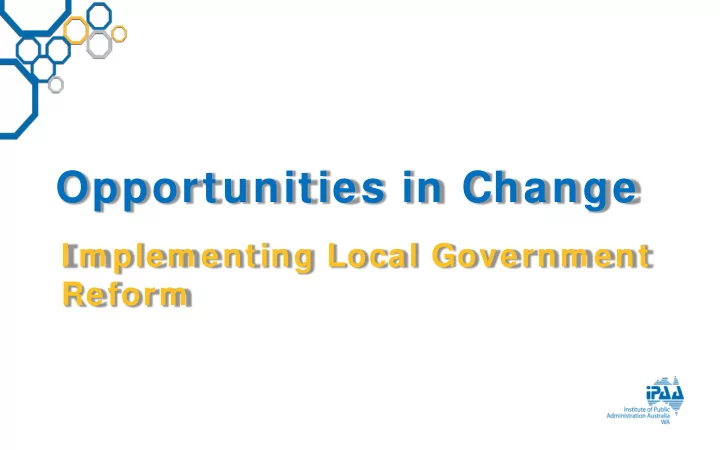

Opportunities in Change I m plem enting Local Governm ent Reform
Seizing the Opportunities in Perth Local Governm ent Reform : Learning from Others? Mr Peter McKinlay Executive Director McKinlay Douglas Ltd
Seizing the Opportunities in Perth Local Government Reform: Learning from Others? Peter McKinlay Research Associate Institute for Governance and Policy Studies Victoria University of Wellington
Three Themes – and Some Contextual Issues Beyond amalgamation – next tasks – how has thinking about LG reform progressed? Costs and Benefits (financial; non-financial). The State/Local Government relationship. But first some contextual issues.
Some Contextual Issues State governments – de facto regional councils for their capital cities. What style of local government? – ‘managerial’ or ‘governmental’? Changing themes in state level local government reform. Clarity – it’s not just your role. It’s how it is understood and delivered. Democracy and Service delivery. Provision and Production.
A Swedish View Democracy Actor Service Operator Citizens as Citizens Citizens as Consumers 1. Learning 1. Provide services 2. Legitimacy 2. Allocate resources 3. Understanding priorities 3. Quality control 4. Transparency 4. Setting standards
More contextual issues The monopoly role of Local Government. What is local government for?
Beyond Amalgamation – Next Tasks Practicalities of complex Learn from the implementation experience of others. Before and after Auckland; arms-length comparisons a distraction entities Focus on what services to what standards should London Borough of this council provide? Barnet – the Queensland comparison commissioning council. Seeking gains from The impact of fiscal increased strategic austerity capacity.
Beyond Amalgamation: Progress in Thinking About LG Reform Jurisdictions in which Local Government is entrenched constitutionally versus jurisdictions in which Local Government is a ‘creature of statute’. Local Government as citizens’ ‘go to’ governmental body for anything which impacts on ‘their place’. Proportionately greater emphasis on community outcomes and proportionately less emphasis on cost and efficiency per se – aided by innovation in service provision/production. Focus shifting from amalgamation (with its negatives for representation and relationships) but query impact on regional level issues and effective liaison with higher tiers of government.
Costs and Benefits: Financial Difficult to measure cost and efficiency impacts of amalgamation. Some evidence that increased strategic capacity can lead to improved infrastructure management and better development and planning control. Real potential for savings may be service by service, selecting the optimal means for production.
Costs and Benefits: Non-Financial Better capability for state/LG relations? Potentially improved satisfaction with service delivery (a consumer outcome). Risk of undermining potential for engagement, and the democratic role of local government (a citizen outcome).
State/LG Relationships: the MLGRP Approach Metropolitan Local Government Review Panel’s recommendations broadly consistent with similar reviews elsewhere (e.g. theNSW). State government motivation should include managing fiscal constraints. Observation suggests initiatives to improve state/LG relationships unlikely to be effective unless they have the full and public backing of the Premier, coupled with accountability with consequences.
State/LG Relationships: Some Emerging Practice Fiscal constraint encouraging a ‘do more with less’ environment. Higher tiers of government looking to work more closely with or devolve directly to communities. Potential for savings high. Co-design, co-production, access to networks and knowledge. Total place and now Localism and community budgeting in England, social sector trials in New Zealand, DHS pilots in Australia.
Pre-conditions Requires capable engaged communities. MLRGP recommendation 10: The newly created local governments should make the development and support of best practice community engagement a priority, including consideration of place management approaches and participatory governance modes, recognition of new and emerging social media channels and the use of open-government platforms.
Who Takes The Lead In Working With Communities? Local Government as the presumed leader of the communities it serves, and the natural provider of capability/capacity development? A higher tier of government as the fiscal risk bearer for expenditure on the major social services delivered within communities? A higher tier of government as the ‘expert’ in the design, targeting and delivery of major social services?
What Experience T ells Us Higher tiers of government reluctant to work collaboratively with local government in engaging with communities. Distrust? Belief that local government lacks capability? Inertia? Patch protection? The DHS example and its implications for Australian local government.
Implications Internationally increasingly common to see LG as the natural leader in enabling community governance. Very hard for states with a ‘managerial’ view of LG to accept. International experience suggests the ‘managerial’ view of LG will increasingly frustrate higher tiers of government getting the results they need.
Conclusions The state and LG have a strong and mutual interest in the better design targeting and delivery of major social services within communities. A principal tool is local government’s potential to be the effective enabler of strong community governance.
Recommend
More recommend